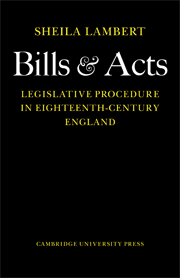Book contents
- Frontmatter
- Contents
- Preface
- Abbreviations
- Introduction
- 1 Robert Harper and parliamentary agency
- 2 Treatises and handbooks
- 3 The clerks: fees and agency
- 4 Parliamentary business
- 5 Private bill procedure
- 6 Estate bills
- 7 Inclosure bills
- 8 Local bills
- 9 Promulgation of the statutes
- 10 Conclusion
- Appendix I List of bills drawn by Robert Harper
- Appendix II Note on parliamentary sources
- Index
2 - Treatises and handbooks
Published online by Cambridge University Press: 07 October 2011
- Frontmatter
- Contents
- Preface
- Abbreviations
- Introduction
- 1 Robert Harper and parliamentary agency
- 2 Treatises and handbooks
- 3 The clerks: fees and agency
- 4 Parliamentary business
- 5 Private bill procedure
- 6 Estate bills
- 7 Inclosure bills
- 8 Local bills
- 9 Promulgation of the statutes
- 10 Conclusion
- Appendix I List of bills drawn by Robert Harper
- Appendix II Note on parliamentary sources
- Index
Summary
Even in the pre-standing order period the rules and conventions of both Houses were complicated enough. In 1765 for the first time the statute book contained more than 200 items. As the need for private legislation increased, parliamentary procedure began to be of concern to more than the members of the Houses. There was need for guidance to the public as to the ways in which parliamentary activity might affect, not only their daily lives as citizens, but their private and business concerns.
The pioneering treatises on procedure, such as those of Lambarde, Hooker, Hakewill and Elsyng, came to an end when Henry Scobell used his position as clerk of both Houses to publish books based on materials that he found among the official records. It is broadly true that no new book on procedure then appeared until Hatsell began to publish his Precedents in 1776. One excludes from this discussion books on the jurisdiction of parliament, notably those of William Petyt and Sir Matthew Hale; and books on election cases.
The books that appeared before the Restoration were addressed primarily to members and were concerned with the regulation of business within the Houses. The conventions governing debate and order had been settled in their broad outline by the later seventeenth century. Between 1685 and 1717 the particular orders were made which regulated the conduct of private business for the greater part of the eighteenth century and these included regulations for matters to be dealt with outside the Houses as a preliminary to business within.
- Type
- Chapter
- Information
- Bills and ActsLegislative procedure in Eighteenth-Century England, pp. 16 - 28Publisher: Cambridge University PressPrint publication year: 1971



